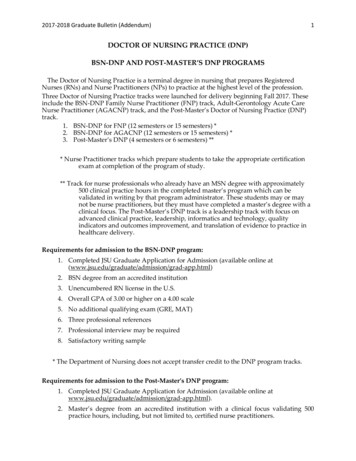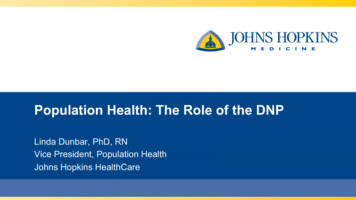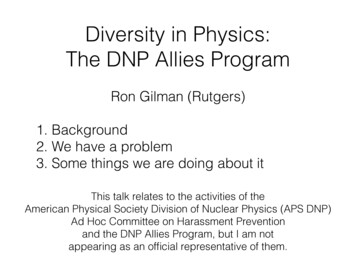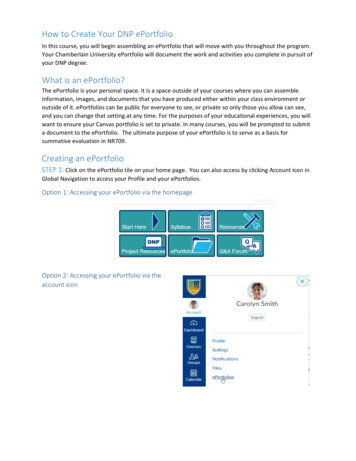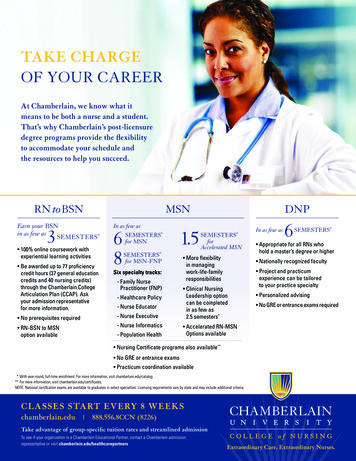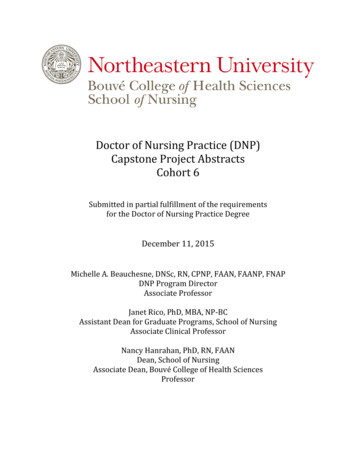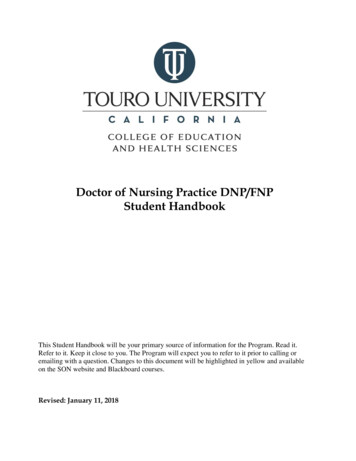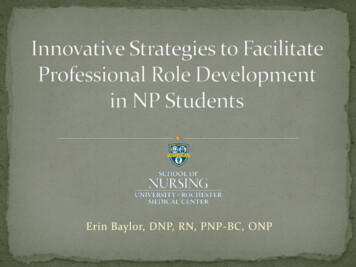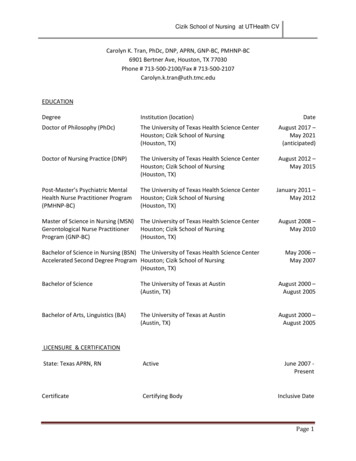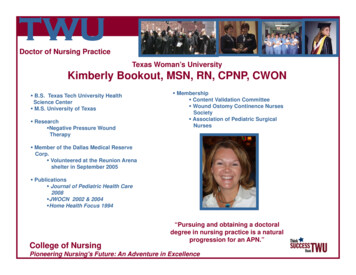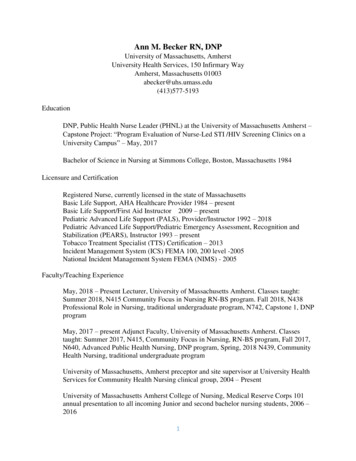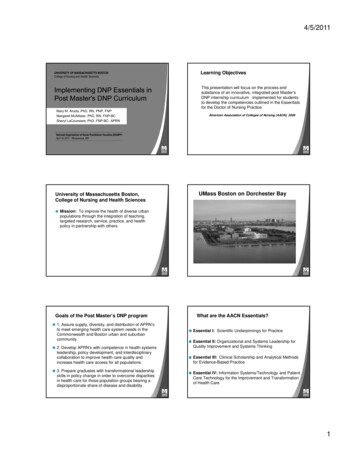
Transcription
4/5/2011UNIVERSITY OF MASSACHUSETTS BOSTONCollege of Nursing and Health SciencesLearning ObjectivesImplementing DNP Essentials inPost Master's DNP CurriculumThis presentation will focus on the process andsubstance of an innovative, integrated post Master’sDNP internship curriculum implemented for studentsto develop the competencies outlined in the Essentialsfor the Doctor of Nursingg PracticeMary M. Aruda, PhD, RN, PNP, FNPMargaret McAllister, PhD, RN, FNP-BCSheryl LaCoursiere, PhD, FNP-BC, APRNAmerican Association of Colleges of Nursing (AACN), 2006National Organization of Nurse Practitioner Faculties (NONPF)April 16, 2011 Albuquerque, NMPresentation Title May 4, 2009University of Massachusetts Boston,College of Nursing and Health SciencesUMass Boston on Dorchester BayMission: To improve the health of diverse urbanpopulations through the integration of teaching,targeted research, service, practice, and healthpolicy in partnership with others.Goals of the Post Master’s DNP program1. Assure supply, diversity, and distribution of APRN’sto meet emerging health care system needs in theCommonwealth and Boston urban and suburbancommunity.2. Develop APRN’s with competence in health systemsleadership policy developmentleadership,development, and interdisciplinarycollaboration to improve health care quality andincrease health care access for all populations.3. Prepare graduates with transformational leadershipskills in policy change in order to overcome disparitiesin health care for those population groups bearing adisproportionate share of disease and disability.What are the AACN Essentials?Essential I: Scientific Underpinnings for PracticeEssential II: Organizational and Systems Leadership forQuality Improvement and Systems ThinkingEssential III: Clinical Scholarship and Analytical Methodsfor Evidence-Based PracticeEssential IV: Information Systems/Technology and PatientCare Technology for the Improvement and Transformationof Health Care1
4/5/201139 Credit Post Master’s DNPWhat are the AACN Essentials? (cont’d)SemesterCourse Name# CreditsNUXXXNU 760Health Informatics*Biostats I or Elective *Spr S2NU 616NU 797NU XXXEvidence Based Practice I *Principles of Epidemiology *Intermediate Biostatistics*3363339Year 1Essential V: Health Care Policy for Advocacy in HealthCareCourse #Fall S1Sum1NU 722Essential VI: Inter-professional Collaboration for ImprovingPatient and Population Health OutcomesYear 2Fall S3Spr S4NU 761NU 716NU 704NU 762Essential VII: Clinical Prevention and Population Health forImproving the Nation’s HealthNU 637Sum 2Essential VIII: Advanced Nursing PracticeYear 3Fall S5Post-Masters Doctor of Nursing PracticeCurrent CurriculumSeminar in Health CareFinancing*DNP Internship II*Psychosocial Mental Health *31373137Summer courses TBA*NU 763DNP Internship III*MBA 650Organizational Analysis/Skills*NU 765Spr S6Summer courses TBA*Health Care Systems andQuality *DNP Internship I *E idEvidenceBasedB d PracticeP ti II *NU 764Leadership/Management inHealth Care*Capstone Seminar &Internship IV*134336TotalCreditsNU 761- DNP Internship I1 Credit Experience in Healthcare OrganizationTheory and evidenced based research are applied withthe goal of improving health care outcomes. Insupervised clinical experiences, students integrate therole of the DNP into the clinical practice context thati l d lleadership,includesd hi consultation,lt tiadvocacy,danddinterdisciplinary collaboration.Internship: 100 hours per semesterTotal: 400 hoursClinical learning is directed at discovering the history,and contextual evidence, and current strategies relatedto problems affecting patient safety and the quality ofhealth care services for populations at risk.NU 761- DNP Internship I1 Credit Experience in Healthcare OrganizationEmphasis is placed on translating research into practice asa means to improve the delivery of health care.Students investigate clinical problemsproblems, and refine the indepth review of the literature started in Evidenced BasedPractice I and further refine the capstone project proposalwork commenced in Evidenced Based Practice II.Prerequisites are: NURSNG 616, 760 and PBHLTHInformatics ; Co-requisite is: NURSNG 7162
4/5/2011Essential I: Scientific Underpinnings for PracticeSubject: 1. Integrate nursing science with knowledge from ethics,the biophysical, psychosocial, analytical, and organizationalsciences as the basis for the basis for the highest level of nursingpracticeDate: September 27, 2010 2:09 PMThrough the integration of scientific knowledge gained from my nursing“Throughpractice, science and nursing-based theories, concepts learned duringthe DNP course work and from evidenced based research, I will evaluate,design and implement a protocol to evaluate risk factors responsible forpostoperative delirium in the elderly general surgical patient. From thesefindings, I plan to build on my MSN preparation as a family nursepractitioner, and incorporate a multidisciplinary approach to identifyingand implementing a protocol for care and treatment to the elderlypatients undergoing general surgery at my facility.”Essential I, DNP I continued2b. Use science-based theories and concepts to: Describe theactions and advanced strategies to enhance, alleviate, andameliorate health and health care delivery phenomena asappropriateDate: September 28,28 2010 8:23 PM“I will use electronic data obtained through a search on pub med, cinahl,and medline as well as a hand search regarding HPV, Pap smears andcurrent guidelines that have been developed with retrospective,prospective, longitudinal, random clinical trials, and cohort studies. Thisinformation will be evaluated for supporting evidence for the current2009 guideline for pap smear. This information will be used to supportguideline changes for women receiving health care at the universitysetting.”Essential I, DNP I continued2a. Use science-based theories and concepts to: Determine thenature and significance of health and healthcare deliveryphenomenaDate: September 28, 2010 11:51 AM“Through a systematic review off the literature I was able to findfsupportfor oral care as a means of oral decolonization and prevention ofaspiration pneumonia in ventilated patients. I was also able to identifygaps in the literature for oral care of non-ventilated swallowing impairedpatients. I hope to provide the support needed to begin to bridge this gapwith my capstone QI project.”Essential I, DNP I continued2c. Use science-based theories and concepts to: EvaluateoutcomesDate: September 28, 2010 8:35 PM“I am not able to say for sure what I would use as I am still workingthrough the process. It is a guideline that I am working on so I havebeen considering the plan, do, study, act Model of Improvement. Rogerstheory on change may be appropriate in this setting as some peopleaccept change readily, others find it difficult to change, these maygradually accept the change when they have enough evidence, andothers continue to hold back. I do know that not everyone is going toreadily accept this new guideline and I will need to be ready to evaluatethe next step. I will do chart reviews to determine how frequently thechange has been implemented. There will be further evaluation afterthis.”3
4/5/2011Essential I, DNP I continued3. Develop and evaluate new practice approaches based onnursing theories and theories from other disciplinesDate: September 27, 2010 5:05 PM“Thus far during my literature review, I have been able to draw evidencefrom other disciplines, specialty journals, etc. An integrated wellnessapproach during pregnancy and the early postpartum period involvesseveral aspects of a patient's health and well-being. Psychologists,medical and nursing practitioners, social workers and nutritionists areseveral of the professionals who have contributed to the pool ofevidence on health and wellness during pregnancy.”Essentials III: Clinical Scholarship and AnalyticalMethods for Evidence-Based PracticeEvaluate practice patterns against national benchmarks todetermine variances in clinical outcomes and population trends(sample topic)Date: October 28, 2010 11:36 AM“The national benchmarks of quality patient education at discharge,readmission rates and patient safety are three areas that I am evaluatingin my current practice.”Essential V: Health Care Policy forAdvocacy in Health CareCritically analyze health policy proposals, health policies, andrelated issues from the perspective of consumers, nursing, otherhealth professions, and other stakeholders in the policy and publicforums considering issues related to global health (sample topic)Date: October 26, 2010 5:03 PMComment posted on next slideEssential II: Organizational and Systems Leadership forQuality Improvement and Systems ThinkingAnalyze emerging clinical patterns and problems within apractice setting, health care organization, or community(sample topic)Date: October 5, 2010 5:26 PM“Through evaluation of demographic data, I identified that the greatestnumber of patients admitted to the general surgical service was in the71 to 80 year age range. The second oldest group of patients admittedto the service was between the ages of 81 and 90. Coupled with thefact that postoperative delirium is one of the most common adverseoutcomes of hospital admissions for elderly patients undergoingsurgery, I investigated whether there was a protocol in place at ourfacility for early identification and interventions for elderly patients atrisk for postoperative delirium.”Essential IV: Information Systems/Technology andPatient Care Technology for the Improvement andTransformation of Health Care.Use information systems technology in the design, selection, useand evaluation of programs to evaluate/monitor outcomes ofcare, care systems, and quality improvement including consumeruse of health care information systems (sample topic)Date: October 19, 2010 8:20 PM“Through concepts learned during the DNP coursework, I will utilize theinformation technology resources at my place of employment to translateresearch findings into evidence-based practice both at the individual andhealth care systems level. I hope to be an integral part of setting up thenew Siemens computer program over the next year that our facility haspurchased. I hope to incorporate the protocol for postoperative deliriuminto nursing assessments as we develop the new information technologyprogram.”Essential V: Health Care Policy forAdvocacy in Health Care (continued)Date: October 26, 2010 5:03 PM“As part of my responsibilities as a nurse practitioner on the surgical team, Ihave been a member of the Surgical Care Improvement Project (SCIP) forthe last five years. SCIP is a national quality partnership of organizationswhich focus on improving surgical care by reducing surgical complications.This program was initiated in 2003 by the Centers for Medicare andMedicaid Services and the Centers for Disease Control and Prevention. SCIPtargets areas where the incidence and cost of surgical complications arehigh and is driven by evidence based recommendations. The team criticallyanalyzes health policy proposals, health policies, and related issues fromthe perspective of consumers, nursing, other health professions, and otherstakeholders in the policy related to surgical care. “4
4/5/2011Essential VI: Interprofessional Collaboration forImproving Patient and Population Health OutcomesEmploy effective communication and collaborative skills in thedevelopment and implementation of clinical practice models,peer review, practice guidelines, health policy, standards ofcare, and/or other scholarly products (sample topic)Date: November 1, 2010 11:48 AM“As part of my responsibilities as a nurse practitioner on the surgicalteam as well as a provider in the emergency department, I have neededto employ effective communication skills to patients, nurses, other staffmembers and attending physicians. It has required extensivecollaborative skills with teams of providers as well. With thedevelopment of new evidence based treatments, effectivecommunication and collaborative skills are necessary to deploy thisinformation and is part of our responsibility as practitioners.”Essentials VIII- Advanced NursingPractice Design, implement, and evaluate therapeutic interventions basedon nursing science and other sciences (sample topic)Date: November 18, 2010 1:47 PM“As an NP I investigate and evaluate therapeutic interventions for mypatients that are based on evidence in the literature. My capstoneproject is based on the latest 2009 ACOG cervical cancer screenings andimplementation of a competency based computer learning module toguide providers in their practice of cervical screening.”Essential VII: Clinical Prevention and PopulationHealth for Improving the Nation’s HealthSynthesize concepts, including psychosocial dimensions and culturaldiversity, related to clinical prevention and population health indeveloping and evaluating interventions to address healthpromotion/disease prevention efforts (sample topic)Date: November 9, 2010 2:07 PM“In my current practice as a cardiac surgery nurse practitioner we care for avariety of culturally diverse individuals who undergo cardiac surgery. As aprovider I must be mindful of the cultural and ethnic influences that affect careof the patients and compliance with regimens that are necessary in the postoperative period for health promotion and disease prevention- especially issuesaround diet, exercise and smoking cessation.“Essential I: Now into Internship 2, DNP IIDate: February 3, 2011 5:11 PM1) I have chosen a Capstone committee. I am in the process of discussing with mycommittee faculty who will be the chair.(Essential 8: Consultation with Expert)2) I am working on revising my Literature Review to fit the author guidelines for thejournal titled: "Patient Education and Counseling".(Essential 1: Refine literaturematrix; Essential III: Manuscript preparation)3) I am starting the process of the IRB application.(Essential III: Construction of IRB Proposal)4) I am in the very beginning stages of starting some exploratory data collection (which Ilearned from the IRB folks does not require approval)!(Essential III: Participation in data collection).Lessons LearnedFirst cohorts of DNP students eager to start on projectstherefore moved up internship courses.Importance of ongoing feedback from students and facultyto avoid overlap in course content.DNP is doctoral study, time intensive for faculty, thereforeworkload/resource allocation very important.Development of tracking mechanisms, electronic logs andportfolios.Importance of communication between program directors,internship faculty, and core coursework faculty5
4/5/2011Post-Masters Doctor of Nursing PracticeAcknowledgements UMB DNP CommitteeKaren Dick, PhD, GNP-BC, FAANP, Committee ChairMargaret McAllister, PhD, RN, FNP-C, FAANP, Co-ChairSheryl LaCoursiere, PhD, FNP-BC, APRNEileen Stuart-Shor, PhD, FAHA, FAAN, ANP, BCPatricia Halon, DNPc, FNP, APRNMary Aruda, PhD, RN, PHP-BC, FNP-BCRrezarta Hyseni, Instructional Designer Institutional SupportGreer Glazer, PhD, RN, CNP, FAAN, DeanJacqueline Fawcett, PhD, RN, FAAN, ChairProposed Revision 11/12/10Internship: 100 hours per semester. Total 400 hoursReferences Essentials of Doctoral Education for Advanced Practice Nursing(AACN, 2006) Zaccagnini, M. E.,, & White, K. W. (2010) The Doctor of NursingPractice Essentials; A New Model for Advanced PracticeNursing. Sudbury, MA: Jones & Bartlett6
UMass Boston on Dorchester Bay 1. Assure supply, diversit y, and distribution of APRN’s to meet emerging health care system needs in the Commonwealth and Boston urban and suburban community. 2. Develop APRN’s with competence in health systems leadership policy development and interdisciplinar
